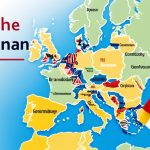Working in Portugal can be an excellent working experience. In our comprehensive guide, learn what makes Portugal’s work culture unique and well-balanced.

Have you ever dreamed of working in a charming European country with stunning landscapes, rich culture, and warm-hearted people? Look no further because Portugal awaits with open arms!
Portugal, nestled on the Iberian Peninsula with a population of up to 10.3 million, has transformed into a service-based model economy with sectors like tourism, technology, and renewable energy flourishing. Portugal’s membership in the EU has facilitated economic growth, attracting foreign investment and bolstering trade.
However, working in a country with a prosperous economy has different working cultures and dynamics. But don’t worry; this article will serve as a guide to Portugal’s unique work culture!
Quick Portugal Statistics
| Population | 10.3 million |
| Language | Portuguese |
| Currency | The euro (EUR) |
| Literacy rate | 98% |
| GDP (nominal) | $250.05 billion |
| GDP (PPP) | $363.81 billion |
| GDP per capita (nominal) | $24,264 |
| GDP per capita (PPP) | $35,780 |
| Unemployment rate | 6.65% |
| Inflation rate | 0.94% |
| Trade balance | -$32.31 billion |
| Main export partners | Spain, France, Germany, Italy, United States |
| Main import partners | Spain, Germany, France, Italy, China |
| Foreign direct investment (FDI) | $200 billion (2021) |
| Top FDI sources | United States, France, Germany, Spain, Netherlands |
Fundamental Business Culture
Portugal’s business and work culture is all about building strong personal connections. People here value trust, honesty, and integrity in their work relationships. They believe working together is better when there’s a solid foundation of trust.
In Portugal, it’s not just about getting the job done; it’s about fostering genuine connections with colleagues and clients. This personal touch often leads to long-lasting partnerships and collaborations. But that doesn’t mean they compromise on formal requirements.
One unique aspect of Portugal’s work culture is work-life balance. People here understand the importance of enjoying life outside of work. This means they usually have reasonable working hours, allowing them to spend quality time with family and pursue personal interests.
In Portugal, work is essential, but so is taking care of oneself and spending time with loved ones. This balance helps people feel more fulfilled and energized, making them even more productive on the job. So, if you want to do business in Portugal, remember that building relationships and balancing work and life are vital ingredients for success in this beautiful and culturally rich country.
Hierarchy

Relationships are key in the work culture of Portugal. Families have always been vital, and helping one another has always been a priority.
In Portugal, hierarchy is essential in the workplace. Decisions are made from the top down, and staff are expected to respect their superiors. This is due to the country’s strong Catholic tradition and patriarchal society, where age and seniority are valued.
In most Portuguese companies, managers are seen as leaders and guides rather than facilitators. They are expected to make decisions and provide direction, while staff members are expected to carry out their instructions. Independent decision-making is not common, and direct criticism of managers is often seen as disrespectful.
This hierarchical structure can make it difficult for new employees to fit in and contribute. It can also lead to a lack of innovation, as staff are reluctant to challenge the status quo. However, it can also create a sense of stability and security for employees, who know where they stand and what is expected.
Working Hours
Local time in Portugal corresponds to Greenwich Mean Time, reflecting London’s schedule. Standard work hours are 9 a.m. to 6 p.m., while stores are open from 9 a.m. to 8 p.m. (some malls are open until 11 p.m.). Public institutions operate from 9 a.m. to 6 p.m., with a break from 12:30 p.m. to 2:00 p.m., which differs from the ‘siesta’ tradition.
The maximum weekly work hours are 40, with an 8-hour daily limit. Annual leave is an intrinsic privilege of 22 days (25 in banking). Fixed-term contracts of less than a year include two days of leave per month, pay, and a commensurate bonus during holidays.
Language and Communication
Although Portuguese is the national language of Portugal and is widely spoken in public, English is the primary medium of communication during business meetings or for formal matters. However, this may differ from one industry to another. We recommend learning the basics of Portuguese or using a translator if you need to become more familiar with their communication medium.
In Portuguese business culture, language is essential for communication and building relationships. Portuguese people are friendly, making communication easy and respectful. Newcomers should start formally and become more informal over time.
Portuguese professionals handle disagreements well due to their love for open discussions. This allows the free exchange of ideas with direct yet polite conversations. Being formal shows professionalism, while being informal builds real connections.
Understanding cultural differences is crucial. Avoid controversial topics, focus on shared interests, and use humor to create a friendly atmosphere. Balancing formality and informality and respecting customs are key to successful business communication in Portugal. This approach helps in navigating the lively Portuguese work culture.
Greetings

Here are some tips on how to greet someone in the work culture of Portugal:
- Shake hands firmly and make eye contact. This is the standard greeting for both men and women, even in business settings.
- Say your name clearly. It is considered polite to introduce yourself in Portuguese, even if you are speaking to someone who speaks English.
- Be respectful of age and position. When greeting someone older or more senior than you, it is customary to use the formal titles “Senhor” (Mr.) or “Senhora” (Ms.).
- Be aware of cultural differences. In Portugal, it is common for women to greet each other with two kisses on the cheek. However, this is not the case in all cultures, so it is important to be aware of the customs of the person you are greeting.
Here are some examples of greetings in Portuguese that you can use in a work setting:
- Bom dia. (Good morning.)
- Boa tarde. (Good afternoon.)
- Boa noite. (Good evening.)
- Prazer em conhecê-lo/a. (Nice to meet you.)
- Como vai? (How are you?)
- Tudo bem? (Everything is fine?)
It is also important to note that Portuguese greetings can vary depending on the region of the country. For example, in the north of Portugal, it is more common to use the informal title “Tu” (you) instead of the formal title “Você” (you).
Dress Code
The dress code in Portugal is generally more formal than in other Western European countries. In business settings, it is common for men to wear suits and ties, while women wear skirts or pantsuits. However, it is also acceptable for men to wear sports jackets and trousers with a shirt and tie and for women to wear dresses or skirts with blouses or sweaters.
In creative industries, the dress code is more relaxed, and it is common to see people wearing jeans and t-shirts to work. However, it is always best to err on caution and dress more formally, especially when starting a new job.
Meetings

It is critical to plan ahead of time when scheduling meetings, booking appointments 1 to 2 weeks in advance, and confirming them a few days before. Avoid organizing meetings in August or the week between Christmas and New Year’s, as many Portuguese individuals take holidays during these seasons.
Punctuality is appreciated, and being on time demonstrates respect. Sometimes, being up to 5 minutes late can still be deemed on time. Meetings frequently begin with informal and small talk before progressing to business discussions. Agendas are used as conversation points rather than complex timetables.
Initial meetings are more about establishing relationships and discussing issues than making quick judgments. Interruptions during conversations are regular, and presentations should be thorough, including visuals such as charts and data to support them. When conversing, make eye contact, and don’t remove your outerwear unless other people do.
In Portuguese business culture, it is preferable to have written promises rather than relying simply on verbal agreements. Inconsistent communication, missing deadlines, and a lack of teamwork are all likely to happen. Patience is essential for developing good business relationships in Portugal.
Body Language and Etiquette
In Portugal’s work culture, body language and etiquette play important roles in creating positive interactions. Maintaining eye contact is valued, showing respect and attentiveness. Handshakes are common when greeting, firm but not overly strong. Personal space is appreciated, so avoid standing too close. Nodding and smiling convey agreement and openness. Portuguese people do not use a lot of gestures when speaking. Some gestures considered polite in other cultures, such as pointing, can be rude in Portugal.
When conversing, be polite and use formal titles like “Sr.” (Mr.) or “Sra.” (Mrs.) is customary until invited to use first names. Punctuality is appreciated, as being late might be seen as disrespectful. During meetings, it’s good to listen actively and avoid interrupting. Sharing ideas is encouraged but with humility. When dining, wait for the host to eat and keep your hands visible above the table.













